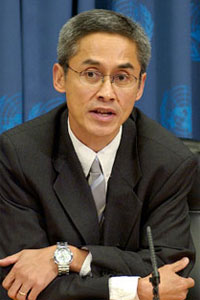
The top of the executive branch has given a welcome signal that it will fast-track in parliament a law to recognise same-sex marriage in Thailand.
Prime Minister Srettha Thavisin said earlier this month the cabinet had approved draft legislation for marriage equality, and it would be tabled in parliament next month.
Parliament last year debated four bills for civil unions for same-sex couples and marriage equality but they failed to be passed before the election and subsequently lapsed.
So, what are some of the key provisions emerging and challenges facing the proposal?
First, some background. The previous government and parliament were faced with bills which took varying approaches.
One approach was to promote a law on civil unions or partnerships which would have upheld a contractual relationship between partners with rights and duties similar to married couples. It would have left untouched the various laws on marriage and would have avoided religious sensibilities, such as the claim by some religious groups that marriage should be between men and women only.
The initial draft of the civil union law only covered same-sex unions. A later draft opened the door to any union -- heterosexual and homosexual. During that period, a competing bill came to light to amend the Civil Code to ensure full recognition of same-sex marriages.
In the meantime, in 2021, a court case was initiated by civil society groups before the Constitutional Court to invalidate section 1448 of the Civil Code, which stipulates that the law allows for marriage between a man and a woman, with the minimum age set at 17 years.
The court rejected the petition to annul the section and added that according to tradition, a marriage is undertaken between a man and woman with a view to procreation. Various words were used in the judgement, which irked the lesbian-gay-bisexual-transgender-intersex (LGBTI) community. The ball was then thrown back to the authorities to legislate with a view to gender diversity.
On another front, it should be noted that while Thailand also has a law on equality between the sexes, it does not go far enough to validate same-sex marriage.
The current plan, at least from the executive branch's view, is to focus on a law concerning same-sex marriages rather than a law on civil unions or partnerships. The bill seeks to amend not only section 1448 of the Civil Code but another 60-plus sections of the code as well.
Basically, references to a man, woman, husband, wife and husband-and-wife are to be deleted, and new terminology will replace those old sex-based distinctions. The new terms for all provisions will be "person", "person offering an engagement", "person accepting an engagement", and "spouses".
While all this might seem quite ambitious, it is only the beginning of the story. Even if those provisions of the code are amended, about 50 provisions in other laws will also need to be amended.
The latter includes various references to man, woman, husband and wife in the tax and pension laws, criminal laws and even some laws concerning national security.
Certain questions arise. Given that internationally, the age of marriage is set at a minimum of 18 rather than 17, should the new law also raise the minimum age of marriage to 18? Perhaps the simple answer is not to overload the bill and leave the issue of marital age to a subsequent law.
Should the new law try to amend the other 50 laws simultaneously? Common sense would dictate against this due to the ambitious scope of the changes being undertaken already.
However, the other 50 laws should certainly not be overlooked, and they should be amended in due course.
What about foreigners who wish to get married here on the basis of a same-sex relationship? This will need to be clarified too. A possible approach is the way France amended its Civil Code (on which the Thai code is based). It permits foreigners proving some links with France (eg "we have a house here") to register their same-sex marriage.
What is the situation of marriage between Thais abroad or between a Thai marrying a foreigner in this country or abroad? The former situation should not be a problem and should be recognised. The latter situation should also be recognised.
However, if the latter is complicated at present, this can be left to a subsequent regulation. Interestingly, French law recognises same-sex marriage between French nationals retrospectively -- even before the entry into force of its same-sex marriage law!
What about religion and the four southern provinces of Thailand where there is a special family law reflecting religious practices? This issue needs some gentle discussion. The preferred way to see the bill on same-sex marriage is that it concerns civil marriage rather than religious marriage.
There are lessons to be learned from other countries. Many same-sex marriage laws in those countries deal with the situation of religion, and admittedly, this is a sensitive area. The compromise is that religious personnel who refuse to officiate or recognise same-sex marriage are not compelled to do so. On the other hand, a religious institution may still find religious personnel willing to officiate and bless the marriage.
Whatever the scenario, the government's decision to raise the matter is a positive sign of the times. It does not take much to respect a loving relationship. Innately, it is also a private matter deserving validation, where we nurture a caring society based on love and friendship, underpinned by a spirit of humanity and gender diversity.
Vitit Muntarbhorn is a Professor Emeritus at the Faculty of Law, Chulalongkorn University. He was formerly a UN Independent Expert on Protection against Violence and Discrimination based on Sexual Orientation and Gender Identity.
